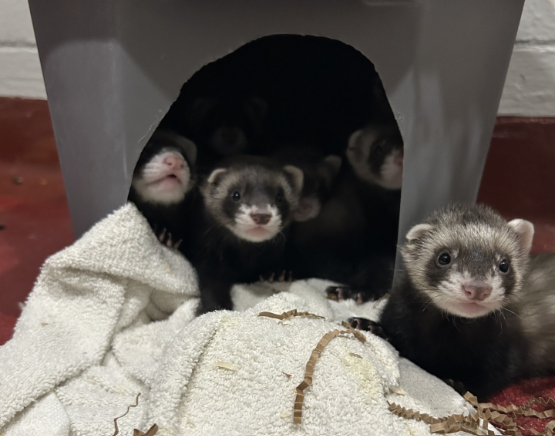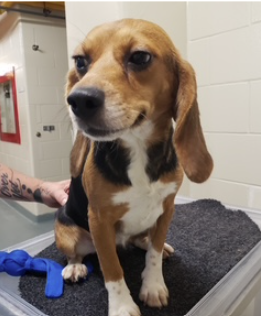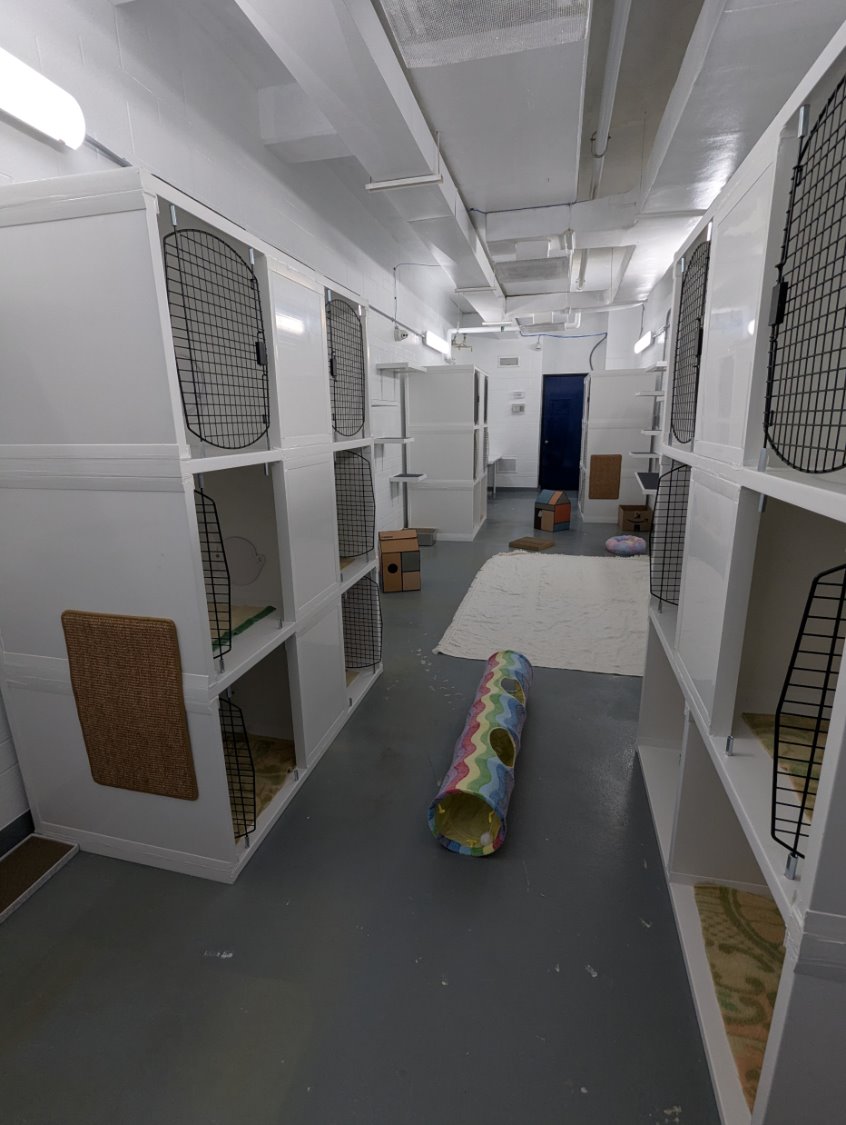Index
- Animal Adoption at UofG – Beagles
- eAUP System Moved to Cloud-Based Server
- Upcoming Non-Compliance Policy
- CCSAW Animal Law Mini-Series
- Spring/Summer 2025 Training Schedule
- New Rodent Ovariectomy SOP
- Are you a new Principal Investigator or Instructor?
- Are you a Student that will be working with animals for the first time?
- Baseline Mortalities for Non-Research Related Causes
Transition to a New AUP System Indefinitely Paused
Plans to implement and transition to a new AUP system have been unexpectedly and indefinitely halted. Many of you contributed to this initiative through the advisory committee, which included representatives from across the research community. The process had progressed significantly — the RFP was completed, system demos were held, and two vendors had been shortlisted. However, we were informed that the procurement of a new system has been stopped due to budget constraints.
The current eAUP system, in place since 2011, is outdated and no longer meets the essential needs of researchers and staff. There was unanimous support for acquiring a new system, making this development especially disappointing. In 2023, the CCAC issued a serious recommendation to UofG, urging the allocation of operational resources toward the acquisition and implementation of an improved animal use protocol management system. Unfortunately, UofG will now have to retract its earlier response to the CCAC.
At this time, there is no timeline for re-starting the project. ACS will continue to keep the animal-using research community informed as new information becomes available.

Some friendly faces shared with us by staff at the Production Animal Isolation Facility
April is Volunteer Month
In this Volunteer Month, we want to extend a heartfelt thank you to all volunteers across campus, including our dedicated ACC members. Your time, expertise, and commitment help support a culture of care, compassion, and integrity in everything we do. We deeply appreciate your contributions without which we would not be able to facilitate research across our community.
Adoption at UofG
On occasions where the nature of research at UofG allows, animals are adopted to live fulfilling lives after their research career. Any potential adoption requires review and approval by an ACS veterinarian in collaboration with the research team and facility staff. Adoption supports the principles of the 3Rs and demonstrates a commitment to ethical responsibility by fostering a humane and sustainable research environment.
For questions regarding adoption, please contact acsvets@uoguelph.ca.

Currently up for adoption
3 Retired Training Beagles Looking for Homes
- One female and 2 males, all 2 years of age
- Have been spayed or neutered
- Well socialized and used to being handled
- Have been used in the training of veterinary students
- Have had teeth cleaning and vaccinations
- Will go home with a bag of dog food
For more information, please contact Michelle Pitre (CAF Technician) directly at mpitre@uoguelph.ca
ACS Highlights
eAUP System Moved to Cloud-Based Server
To secure the eAUP system while keeping it up and running as is, the eAUP system has moved to a cloud-based server in the Pantheon hosting platform. Services is now provided by an external vendor, Woolwich WebWorks. Following a testing phase, the move to the cloud-based server occurred on April 8, 2025. ACS asks that you alert acc@uoguelph.ca to any issues that you see when using the eAUP system. One benefit observed is that the speed of the system appears to have improved considerably.
CCAC Volunteers
In the Volunteer Month of April ACS would like to thank UofG researchers and staff who give their time, expertise, and knowledge to assist CCAC in developing guidelines:
-
Animal Use Data Consultive working Group
- Dr. Lena Levison
-
Categories of Welfare Impact
- Dr. Rene Bergeron
-
Dogs
- Dr. Sarah Baert
-
Endpoints
- Ms. Annette Morrison
-
Ethics Principles
- Dr. Georgia Mason
-
Farm Animals
- Dr. Anna Bolinder
-
Hamsters and Guinea Pigs
- Ms. Nicole Fletcher
- Dr. Coral Murrant
- Dr. Lee Niel
-
Reptiles
- Dr. Matthew Vickaryous
-
Translation Advisory Group
- Ms. Kristyn Fournier
-
Wildlife
- Dr. Sherri Cox
Members of CCAC Assessment Panels
Chosen as scientists or animal health professionals with expertise and experience in specific types of animals or experimental procedures:
- Dr. Marcia Chiasson - Scientist
- Ms. Michelle Cieplak - Technician
- Dr. Lena Levison - Veterinarian
- Dr. Lee Niel - Scientist
General News
ACC
New Members Needed! If you believe that you or someone you know could bring valuable insights to the committee, click to find out more!
CCAC Assessment Recommendations – Non-Compliance Policy
In our most recent CCAC assessment, one serious recommendation was to ensure that “a comprehensive non-compliance policy be developed and supported in practice to align with CCAC standards and expectations from federal granting tri-agencies”.
To address this recommendation, two documents addressing non-compliance matters are being prepared by ACS on behalf of the ACC:
- Administrative Compliance (e.g. timelines for AUP renewals, notifications to PIs, and consequences in case of no response)
- Unexpected or unplanned events creating circumstances for an AUP to be placed in non-compliance (e.g. AUP procedural deviations, repeated animal incidents).
Please stay tuned for these upcoming documents. If you have any questions, contact the ACS office at acc@uoguelph.ca.
The Campbell Centre for the Study of Animal Welfare (CCSAW) presents its Animal Law Mini-Series, which explores topics in animal welfare and legal frameworks. The series features insightful discussions from experts in the field, offering diverse perspectives on the evolving landscape of animal protection laws.
You can watch the entire series on CCSAW's YouTube channel. Don't miss this opportunity to deepen your understanding of animal welfare and law!
Training
Please refer to the Facility Orientation and Workshop Schedule page on the Animal User Training Program website for all training schedules. For specific guidance on what training you require to work with or care for animals at UofG, contact us at training@uoguelph.ca.
New Rodent Ovariectomy SOP
SOP.ACC.822.Rodent Ovariectomy is a technical SOP that instructs the user on how to perform the ovariectomy surgical procedure in rats and mice. The context for its development was to create an institutional standard for the procedure, to provide researchers with an SOP to attach to their AUP, and to be a reference for surgeons in training.
AUPs
AUP help drop-in sessions held every Wednesday from 1:00-2:30pm in-person with ACS or virtually on Teams. Check out the Interactive Support Sessions for Researchers page for more information.
Are you a new Principal Investigator or Instructor?
ACS has put together a list of resources and reminders to help you get started with your work.
Are you a Student that will be working with animals for the first time?
ACS has put together a list of resources and reminders to help you get started with your work.
Baseline Mortalities for Non-Research Related Causes
To meet CCAC expectations, the ACC will implement the inclusion of baseline mortality in all new AUPs as the CCAC considers it essential to quantify potential mortality as a component of assessing the impact of science on animals. Baseline mortality refers to the natural attrition associated with the biology or life stage of a species, even under conditions of good husbandry and care. For example, high mortality rates are common during the early growth stages of certain fish species, and to a lesser extent in young cohorts of chicks, piglets, and lambs. This type of mortality is distinct from experimentally induced mortality, which results from research procedures or environmental factors related to the study. A baseline mortality of zero should be indicated for animals not expected to die under normal conditions, such as adult animals housed in controlled facilities.
PIs will be expected to list a reasonable baseline mortality for the animals on their AUP. If animals are sourced from the research stations, the baseline mortality is likely already determined and the data may be transferred from the General Holding AUP.
Questions or guidance on determining the baseline mortality for your AUP may be discussed with the ACS veterinarians at acsvets@uoguelph.ca. The ACC will approve baseline mortality on all new AUPs.
Baseline mortality will be added as a question on the AUP within the next month, please look to complete it for all new submissions and at time of annual renewal. We thank you for your cooperation.
Community Spotlight

Led by two PhD students, Luciana Guimaraes Reis and Sarah MacDonald Murray, the team from the laboratory of Dr. Anna Kate Shoveller in the Department of Animal Biosciences have designed two new cat colony rooms. The rooms allow cats freedom of movement and opportunities to express their natural behaviours, such as climbing, scratching, hiding, and perching. Temperature, humidity, ventilation, lighting, sound, and odor were all considered to provide a safe and enriching environment for the cats across different life stages, setting a high standard for housing research animals. In addition, the design allows for control of feeding and husbandry which includes non-invasive video monitoring. These rooms will support fundamental research in feline nutrition and behaviour. Dr. Shoveller hopes that the research planned for these rooms will improve the lives of cats and their human companions worldwide.
To have your work or a fun photo of your animals highlighted, share it with us. Each issue will include one submission as we champion our community and the amazing animals that make our work possible.
Upcoming Events

Compassion Chat Circles
- April 23, 2025 12-1pm
- Register for Compassion Chat Circles
UofG Animal Tribute Event
- May 7, 2025 3-4:30pm
- Registration and Kudo board for UofG Animal Tribute Event
AALAE Webinar
- Leveraging Technology to Enrich Animals' Lives with Dr. Rebecca Kleinberger
- June 4, 2025 1pm EST
- Register for AALAE Webinar
2025 North American Regional Meeting of the International Society of Applied Ethology
- May 14-15, 2025
- The Arboretum Centre
- Register for 2025 North American Regional Meeting of the International Society of Applied Ethology
Resource Corner

- Animal Care Services
- Animal Care Committee
- ACS FAQs
- Interactive Support Sessions
- Archived ACS Newsletters
- RSO Document Locker
- AUP System
- CCAC Website
- Animals for Research Act
- National Centre for 3Rs
- North American 3Rs
- Norecopa 3R's
Contact Us
- Newsletter - acc@uoguelph.ca
- AUP - acc@uoguelph.ca
- Training - training@uoguelph.ca
- Post-Approval Review - accpost@uoguelph.ca
- ACS Veterinarians - acsvets@uoguelph.ca
- Chair of the ACC - chairacc@uoguelph.ca
